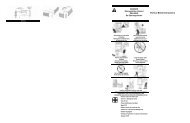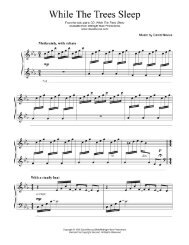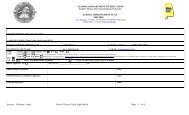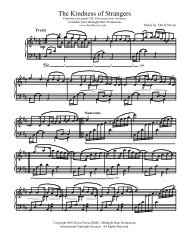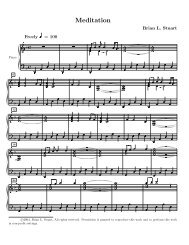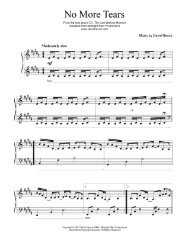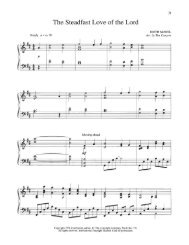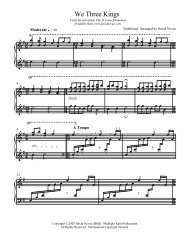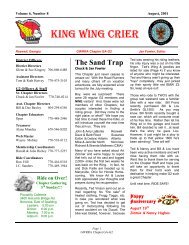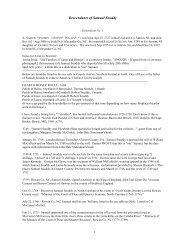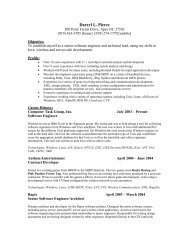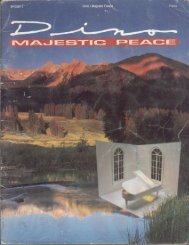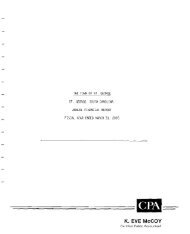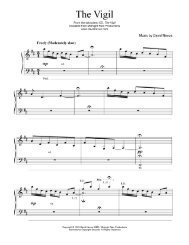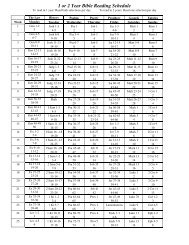7.Addenda - Bellsouthpwp.net
7.Addenda - Bellsouthpwp.net
7.Addenda - Bellsouthpwp.net
You also want an ePaper? Increase the reach of your titles
YUMPU automatically turns print PDFs into web optimized ePapers that Google loves.
The Murder of Zoeth Howland<br />
Page 351<br />
Posted to the Inter<strong>net</strong> 6 Jan. 2001 at http://www.genforum.com/howland/messages/964.html by Richard W. Gifford<br />
and reprinted here by permission.<br />
Jane Fletcher Fiske, who is the editor of NEHGR and the foremost living early<br />
Rhode Island genealogist, discovered old court records from Newport County that<br />
had been in storage for over 300 years. Among these are records of the court<br />
martial of various Indians that occurred in the aftermath of King Philip's War.<br />
She published these court records in 1996 (Records of the Rhode Island General<br />
Court of Trials), but since the book is probably not widely available I thought<br />
I would post here some of the records relating to the trial of the murderer[s]<br />
of Zoeth 2 Howland. Since the entry is fairly lengthy I will divide it into two<br />
parts and post the second installment in the near future. Zoeth 2 (Henry 1)<br />
Howland of Dartmouth, MA was waylaid by a group of Indians at what has ever since<br />
been called “Sin and Flesh Brook” in Tiverton, RI. Tiverton was not settled at<br />
the time, and Zoeth was on his way from Dartmouth to Newport to attend a Quaker<br />
meeting, as a meeting had not yet been established in Dartmouth. I will put my<br />
own notes in brackets. These are the entries for 31 August 1676.<br />
"Manasses (Molasses) called and Answered to the name, being Examined, concerning Zow Howland kild at<br />
Pocassett side [Pocasset was an early name for what is now Tiverton; it is a Wampanoag word that probably<br />
means "where the river widens," referring to the widening of the Sakon<strong>net</strong> River north of Fogland Point in<br />
Tiverton and Sandy Point in Portmouth] (being an Englishman) and slaine or murdered by the Indians, and<br />
this Molasses being charged or suspected to have a hand in the crime, answers that he did not kill him, but<br />
being up in the woods the Indians came and said such a one was kild and offered to sell the coate of the<br />
person soe murdered or slaine, and that he the said Mallasses bought the coate of the (said dead man) for<br />
ground nutts [these are tubers that grow wild in New England, eaten by both Indians and some early colonists]<br />
and further saith that it was one Quasquomack that killed the said Howland.<br />
Mr. [probably Christopher 2 (William 1)] Almy [he spoke fluent Wampanoag and was one of chief colonial<br />
negotiators with Metacom/King Philip] declared that at Plymouth being, Examination being then upon the<br />
death of Howland [Dartmouth was in Plymouth Colony, as was Tiverton once it was settled] it was declared<br />
there that this Indian now present, with two others one named Ohomm, the other Quasquomock did kill the<br />
said Howland. [In a modern trial none of this would be admissible evidence.]<br />
This Deponant John Cook [John 2 (Thomas 1) Cooke (1631-1691)] aged about forty five years Testefyeth,<br />
being at Punkatest [Punkateest, an early name for the southern part of Tiverton] in the middle of July or<br />
thereabouts, did ask of severall Indians named as followeth, Woodcock, Matowat, & Job, whome they were<br />
that kild Zow Howland the fore-sd Indians answer was that there were six of them in company and Manasses<br />
was the Indian that fetcht him out of the water further this deponant saith not.<br />
This Deponant John Brigs [John 2 (John 1) Briggs (1609-1690)] aged thirty five years or thereabouts<br />
Testefyeth . . . that the said Manasses shot at Joseph Russill...<br />
This deponant William Manchester [William 2 (Thomas 1) Manchester (1654-1718), son-in-law to John 2<br />
Cook above] aged twenty and two years or thereabouts, being at Pocasset asked of Peter Nunoet the husband<br />
of Wetamoe, whoe it was that killed Zow Howland, his answer was, that Manasses fetcht him out of the water<br />
and further saith not. [This refers to Peter Nunuit, supposedly the brother of Awashonks, the "squaw sachem"<br />
of the Sakon<strong>net</strong> tribe of Little Compton. Awashonks remained neutral in King Philip's War, but many<br />
Sakon<strong>net</strong>s fought with Col. Benjamin Church's colonial forces. Wetamoe, the squaw sachem of the Pocassets<br />
of Tiverton, sided with King Philip; she had drowned while trying to escape a colonial raid on her camp. A<br />
recent aquisition of public parkland in Tiverton has been named "Wetamoo Woods," an honor that would<br />
have been unthinkable in 1676.]



